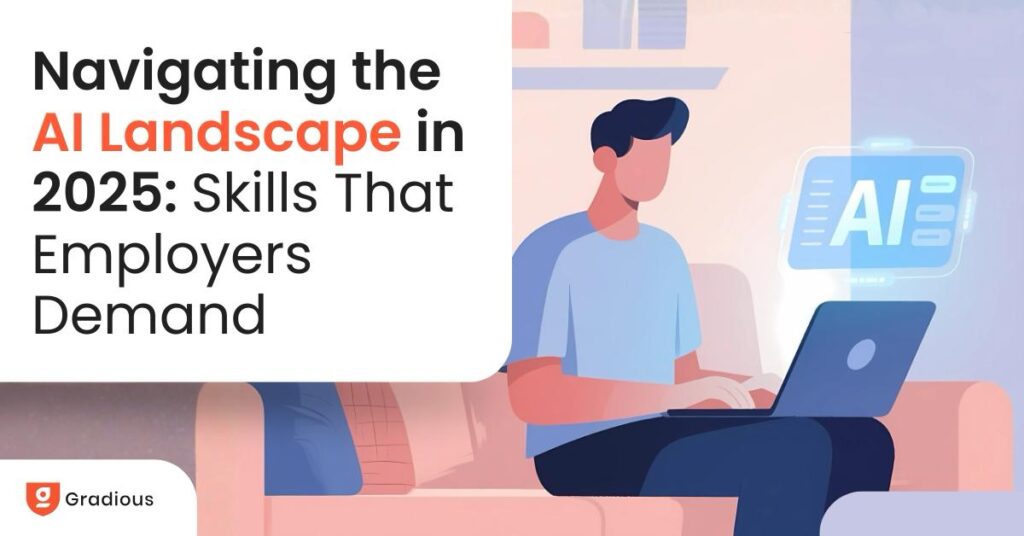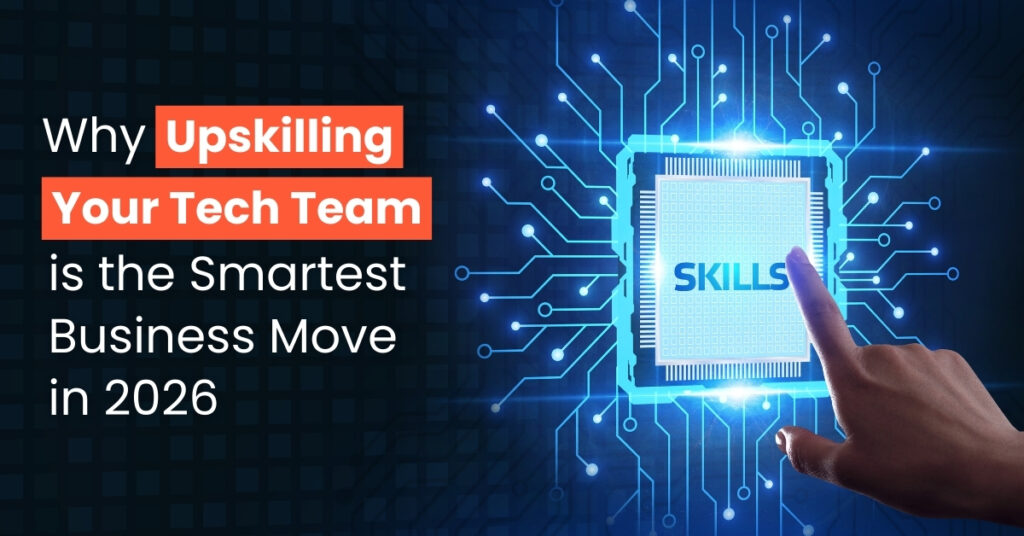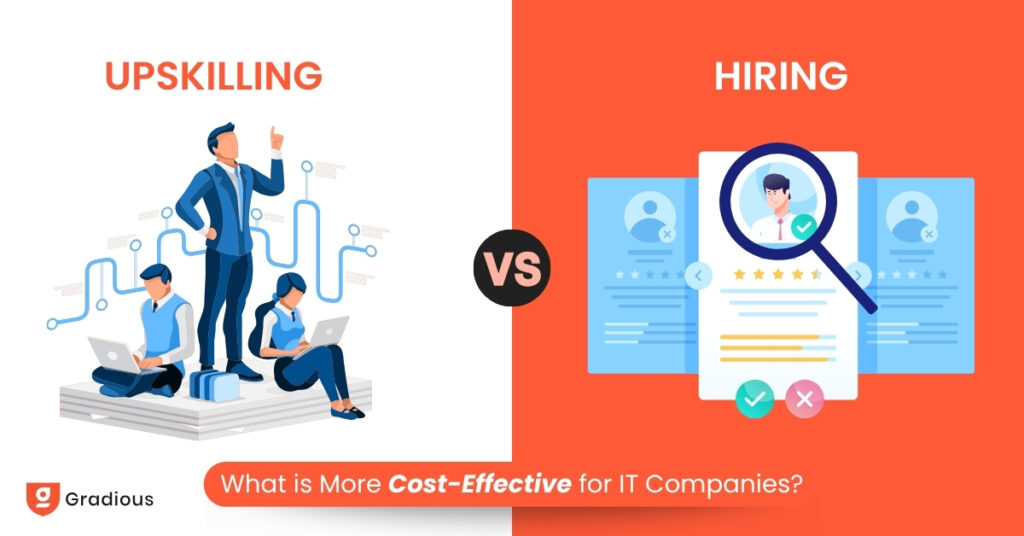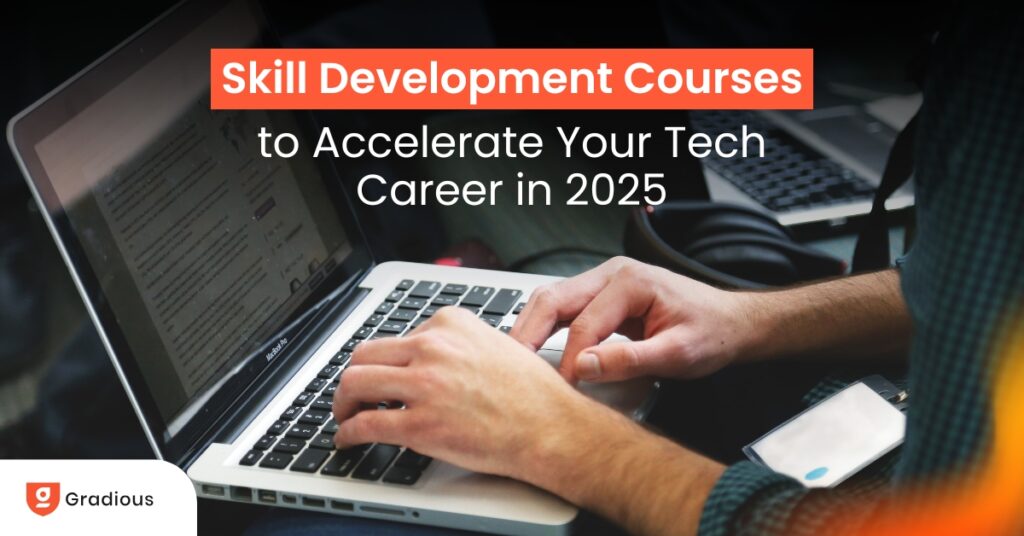Artificial Intelligence (AI) is no longer a futuristic idea; it is now a driving force behind innovation across AI-driven industries. From finance and healthcare to retail and logistics, organizations are actively rethinking operations and strategies with AI at the core. As we step into 2025, the demand for AI skills in 2025 is accelerating, reshaping what employers look for in talent. For professionals and students alike, understanding these shifts is key to thriving in an AI job market trend that rewards adaptability and expertise.

The Evolving AI Landscape in 2025: AI Skills in 2025
The future of artificial intelligence in 2025 is defined by widespread adoption and practical application. Businesses are shifting from pilots to large-scale AI deployments. Generative AI tools are becoming workplace staples, AI agents are assisting in customer service and operations, and automation is redefining repetitive roles. This means employers are seeking professionals who can both harness the power of AI and ensure its responsible use.
Why AI Skills in 2025 Matter to Employers Today
Employers are focused on two things: efficiency and innovation. AI promises both, but only if organizations have people who can implement it effectively. Skilled professionals help businesses:
- Derive insights from massive data streams.
- Build intelligent systems that enhance decision-making.
- Ensure ethical, transparent, and reliable AI use.
In short, AI skills in 2025 aren’t just technical assets; they’re strategic enablers of business growth.
Core Technical AI Skills in 2025 Employers Demand
Machine Learning & Deep Learning
These remain the backbone of AI development. Employers need professionals who can build predictive models, train neural networks, and fine-tune algorithms for complex tasks.
Natural Language Processing (NLP)
With the rise of chatbots, voice assistants, and AI-driven communication, NLP has become a high-demand skill. Understanding how to work with text and speech data is vital in industries like healthcare, customer support, and education.
Data Science & Analytics
AI runs on data. Skills in cleaning, analyzing, and interpreting data ensure organizations can derive actionable insights and forecast trends with accuracy.
Computer Vision
From quality checks in manufacturing to medical imaging, computer vision applications are expanding rapidly. Employers are looking for talent that can design models to interpret and analyze visual data.
AI-Powered Automation & Robotics
The blend of AI and robotics is redefining industries such as logistics, automotive, and healthcare. Knowledge of AI-driven automation workflows can help professionals streamline operations at scale.
Prompt Engineering & AI Agents
The rise of generative AI tools has created demand for “prompt engineers” who can effectively interact with models and design AI agents for business tasks. Crafting the right prompts is becoming a skill of its own.
Generative AI Tools
Tools like ChatGPT, MidJourney, and Copilot are not just novelties; they’re integral to workplace productivity. Employers want individuals who can use these tools for creativity, prototyping, and workflow optimization.
Programming & Data Skills
Python, R, SQL, TensorFlow, and PyTorch remain foundational. Strong programming and data management expertise are non-negotiable for building and deploying AI solutions.
Essential Non-Technical Skills for AI Careers: AI Skills in 2025
Critical Thinking & Problem-Solving
The value of AI depends on the relevance of the problems it is applied to. Employers value professionals who can analyze situations, identify challenges, and align AI tools with business goals.
Ethics in AI & Responsible Innovation
Bias, fairness, and accountability are pressing concerns. Organizations want talent that understands the societal impact of AI and can guide its responsible use.
Cross-Functional Collaboration
AI projects rarely exist in silos. Professionals must work with diverse teams, from engineers to marketing, to ensure successful implementation.
Adaptability & Continuous Learning
The AI field evolves rapidly. Employers seek individuals who can continuously learn, upskill, and stay ahead of technological shifts through AI learning and development.
AI Communication Skills
Explaining AI concepts to non-technical stakeholders is critical. Those who can bridge the technical-business gap gain a significant edge in the workplace.
Emerging AI Roles in 2025
As AI adoption grows, new job titles are becoming mainstream:
- AI Product Manager – connecting AI capabilities with business priorities.
- AI Ethics Specialist – ensuring responsible innovation.
- Prompt Engineer – designing effective AI-human interactions.
- AI Trainer/Curator – refining data and models for accuracy.
- Robotics Process Automation (RPA) Specialist – integrating automation with workflows.
- Generative AI Designer – uses AI tools for content creation and design.
These AI career opportunities reflect the diverse directions professionals can explore.
How to Stay Ahead of the Curve
To thrive in the AI job market trends of 2025, professionals should:
- Invest in Continuous Learning: Online courses, certifications, and workshops keep skills current.
- Build Practical Experience: Hands-on projects, hackathons, and open-source contributions showcase capability.
- Stay Informed: Following AI research, industry updates, and ethical debates helps maintain relevance.
- Develop Hybrid Skillsets: Combining technical expertise with business acumen and communication skills creates standout candidates.
- Network & Collaborate: Engaging with AI communities, forums, and professional groups opens doors to opportunities and insights.
Conclusion
The AI skills in 2025 landscape is dynamic, demanding, and full of opportunity. Employers are looking for professionals who combine deep technical expertise with critical soft skills, ethical awareness, and adaptability. For those willing to invest in continuous learning and embrace both technical and non-technical competencies, AI careers will remain some of the most rewarding in the job market.
Now is the time to build the right skill mix — not just to keep up, but to lead in the future of artificial intelligence.
Become an AI innovator with Gradious.





